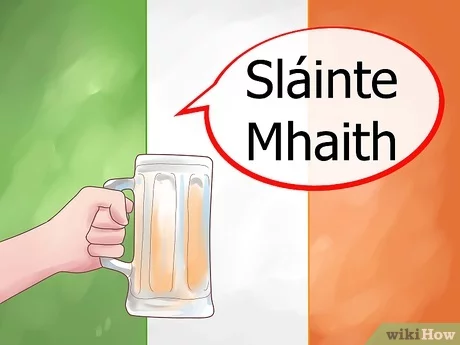In Irish, the response to sláinte is sláinte agatsa, which translates “to your health as well”. The basic Scottish Gaelic equivalent is slàinte (mhath), with the same meaning, to which the normal response is do dheagh shlàinte “your good health”.
Why do people say slàinte?
“Cheers” in Irish is sláinte which is pronounced a bit like “slawn-che”. Sláinte means “health”, and if you’re feeling brave, you can say sláinte is táinte (“slawn-che iss toin-che”), meaning “health and wealth”. “Cheers” is one of the words included in lesson 10 of our course.
What does slàinte Mhath mean?
The Irish spell it Slàinte Mhaith. The phrase translates to “Good health” in both dialects, and if you want to respond to this using Scots Gaelic, you would say, “do dheagh shlainte” meaning “to your good health.” Where did Gaelic originate?
What do the Irish say to toast?
Exclaim “Sláinte!” This is the closest term you can use to toast someone “cheers!” in Irish Gaelic. More accurately, the term “sláinte” translates into the English term “health.” When using this term, you are essentially toasting to someone’s health. Pronounce this Irish term as slawn-cha.
What does slàinte Mhath mean?
The Irish spell it Slàinte Mhaith. The phrase translates to “Good health” in both dialects, and if you want to respond to this using Scots Gaelic, you would say, “do dheagh shlainte” meaning “to your good health.” Where did Gaelic originate?
How do you say good luck in Ireland?
Go n-eirí an t-ádh leat is one way of wishing ‘good luck’ which literally means, ‘That luck may rise with you! ‘
How do the Irish say goodbye?
To say Goodbye in Irish you would say “Slán leat” – literally meaning “goodbye (health) to you”. You can be less formal and just say “Slán”, bye. Or as we say in our own video … “Slán go fóill” – Bye for now.
What do Scots say when they toast?
The traditional Scottish Gaelic toast when raising a glass to say ‘cheers’ is Slàinte mhath which is pronounced slan-ge-var.
Do Scottish people say Dinna fash?
The Scots phrase “dinna fash” has the meaning of “don’t fret,” “don’t stress,” or “don’t worry.” This phrase is common in Scotland, with most generations using the expression and understanding its meaning.
What do Irish say before drinking?
“Sláinte!” (Pronounced slawn-cha, it means “good health” in Ireland.)
What is the most common Irish toast?
“May your troubles be less, and your blessings be more. And nothing but happiness come through your door.” “To all the days here and after, may they be filled with fond memories, happiness and laughter.” “May the best day of your past be the worst day of your future.”
What is a good Irish saying?
May your home always be too small to hold all your friends. May the cat eat you, and may the devil eat the cat. There’s no need to fear the wind if your haystacks are tied down. May your heart be light and happy, may your smile be big and wide, and may your pockets always have a coin or two inside!
Does sláinte mean goodbye?
Slán is another Gaelic term that sounds like sláinte, but has a different meaning. It means goodbye.
What do the Scots say when they toast?
The traditional Scottish Gaelic toast when raising a glass to say ‘cheers’ is Slàinte mhath which is pronounced slan-ge-var.
Do they say sláinte in Northern Ireland?
People in both the Republic of Ireland and Northern Ireland use Slàinte.
What does slàinte Mhath mean?
The Irish spell it Slàinte Mhaith. The phrase translates to “Good health” in both dialects, and if you want to respond to this using Scots Gaelic, you would say, “do dheagh shlainte” meaning “to your good health.” Where did Gaelic originate?
What do the Irish say to toast?
Exclaim “Sláinte!” This is the closest term you can use to toast someone “cheers!” in Irish Gaelic. More accurately, the term “sláinte” translates into the English term “health.” When using this term, you are essentially toasting to someone’s health. Pronounce this Irish term as slawn-cha.
Do the Irish really say top of the morning to you?
Usage notes. This term should be considered apocryphal of Irish speech and is a stereotype. While popularly used in the United States when imitating Irish people, or when celebrating one’s Irish heritage (e.g. on St. Patrick’s Day), latter-day native Hiberno-English speakers would be unlikely to ever use this phrase.
What is the traditional Irish blessing?
Traditional Irish blessing – you might know this one “May the raindrops fall lightly on your brow, may the soft winds freshen your spirit, may the sunshine brighten your heart, may the burdens of the day rest lightly upon you, and may God enfold you in the mantle of His love.
What is an Irish breakfast?
All full Irish breakfasts include some or all of the following: Bacon, sausages, baked beans, eggs, mushrooms, grilled tomatoes, and perhaps some cooked leftover potatoes made into a hash or a bubble and squeak. There will also be toast, butter, marmalade, and lots of tea to drink.
Is Irish exit rude?
The Irish exit is not rude. It’s a sign of emotional intelligence — of candor, of self-assuredness. It means you know where you stand with everyone else, that you have some semblance of awareness.
How do they say cheers in Outlander?
Outlander’s Gaelic coach Àdhamh Ó Broin shares the latest “Speak Outlander” phrase, “Slàinte Mhath,” which is a toast to good health.









